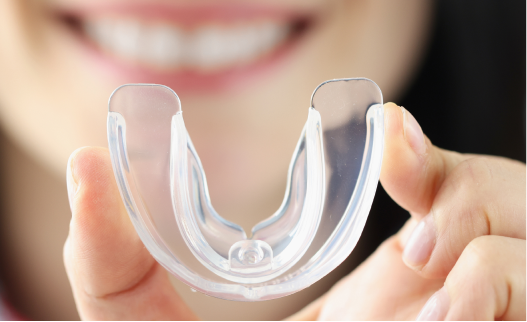
Do you wake up with facial muscle soreness, jaw joint tenderness, toothaches or headaches? Has your sleeping partner noticed that you grind your teeth? Do you want to protect your dental work (fillings, crowns, veneers, implants) from damage while you sleep?
A night guard, also called an occlusal (bite) guard or splint, is a removable appliance designed to separate and protect your teeth from involuntary actions like clenching and grinding while you sleep. Clenching and grinding, also known as bruxism, can be destructive to your teeth and dental work over time, causing wear, sensitivity and even tooth fracture. As your dentists, it is important to us to look for signs of tooth wear from clenching or grinding, and there are a number of factors we evaluate during your routine dental checkup that can help us diagnose clenching or grinding habits:
- Assessing your jaw joints for soreness or sounds (clicking, popping)
- Evaluating your facial muscles for increased muscle tone
- Asking about clenching or grinding habits, either during the day or at night
- Examining the biting surfaces of your teeth for flattening, chipping, or cracks
- Checking teeth and dental restorations for damage from tooth wear caused by clenching or grinding
- Discussing any symptoms of tooth pain. Clenching and grinding can cause generalized tooth pain, especially after first waking up or during periods of stress. Cracked, fractured teeth can have symptoms of sensitivity when you bite down, as well as hot or cold sensitivity
A night guard is essential to protecting your dental work from damaging tooth wear. A common cause of implant failure is teeth grinding, due to implant movement. Fillings, crowns and veneers can be prone to chipping, cracking, or even debonding and falling off as a result of teeth grinding. The effects of teeth grinding and clenching can be inconvenient, costly, and even painful, which is why we recommend night guards to protect your teeth and dental work.
After a thorough examination of the head and neck region, hard and soft oral tissues, and discussion of your medical and dental history, we may recommend having a custom night guard made to protect your teeth and dental work. Making a night guard is fast and easy – we will take a 3D intraoral scan to capture your upper and lower teeth as well as your bite – no gooey, uncomfortable impressions necessary! The scanning process takes less than 10 minutes, and is easy and painless. Our scanner converts these images into a 3D model of your teeth, which we send to our laboratory for fabrication of a custom-fit night guard, which takes about 1-2 weeks. When the night guard is ready, we will have you come in to try on the night guard, assess the fit, and make any adjustments needed to ensure an even, balanced bite when wearing the night guard. The night guard is made of acrylic-like material that is safe and durable for regular use. The night guard will be made to fit on either your upper or lower teeth, based on your individual needs.
Can I buy a night guard over-the-counter?
We strongly recommend a dentist-prescribed, custom-fit night guard as they offer superior fit and protection. Over-the-counter night guards are one-size-fits all and may not offer balanced protection, which can lead to jaw joint and facial muscle soreness. When we deliver your night guard, we carefully assess your bite to ensure it is balanced to ensure comfortable wear. We work closely with our laboratory to ensure your night guard is durable and fit to last. We encourage patients to bring in their night guard each time they visit so it can be professionally cleaned and evaluated.
Here are some helpful tips regarding night guard use, clenching and grinding:
- Visit us for regular dental checkups. We can help identify signs of clenching, grinding and tooth wear, often preventing inconvenient, costly dental work in the future.
- Ask us about therapeutic BOTOX® to reduce stiffness and hyperactivity of muscles involved with clenching and grinding.
- Practice relaxing activities such as meditation or yoga. Stress is a common cause of clenching and grinding.
- Minimize caffeine and alcohol consumption. Caffeine and alcohol can lead to increased clenching and grinding.
- Be mindful. If you notice yourself clenching or grinding, pressing your tongue to the roof of your mouth can help relax your lower jaw and alleviate discomfort. Be sure to inform your dentist at your next visit to ensure proper treatment.
- Night guards can take time to get used to. Like any positive habit, we recommend wearing yours consistently each night, even if it feels unfamiliar at first. With regular use, most people adjust within a couple of weeks and begin to notice the benefits — like reduced jaw tension, better sleep and protection against tooth wear.
Questions? Call 214-380-9071 to schedule your next dental visit! Together, we can develop a personalized treatment plan to address your needs and determine whether a night guard is right for you.




